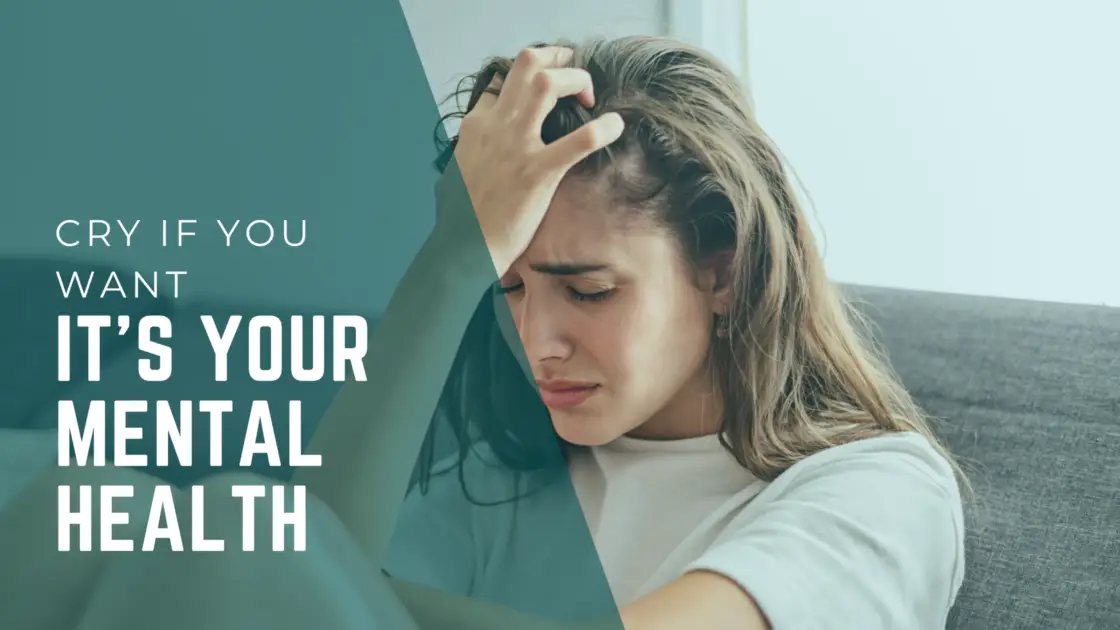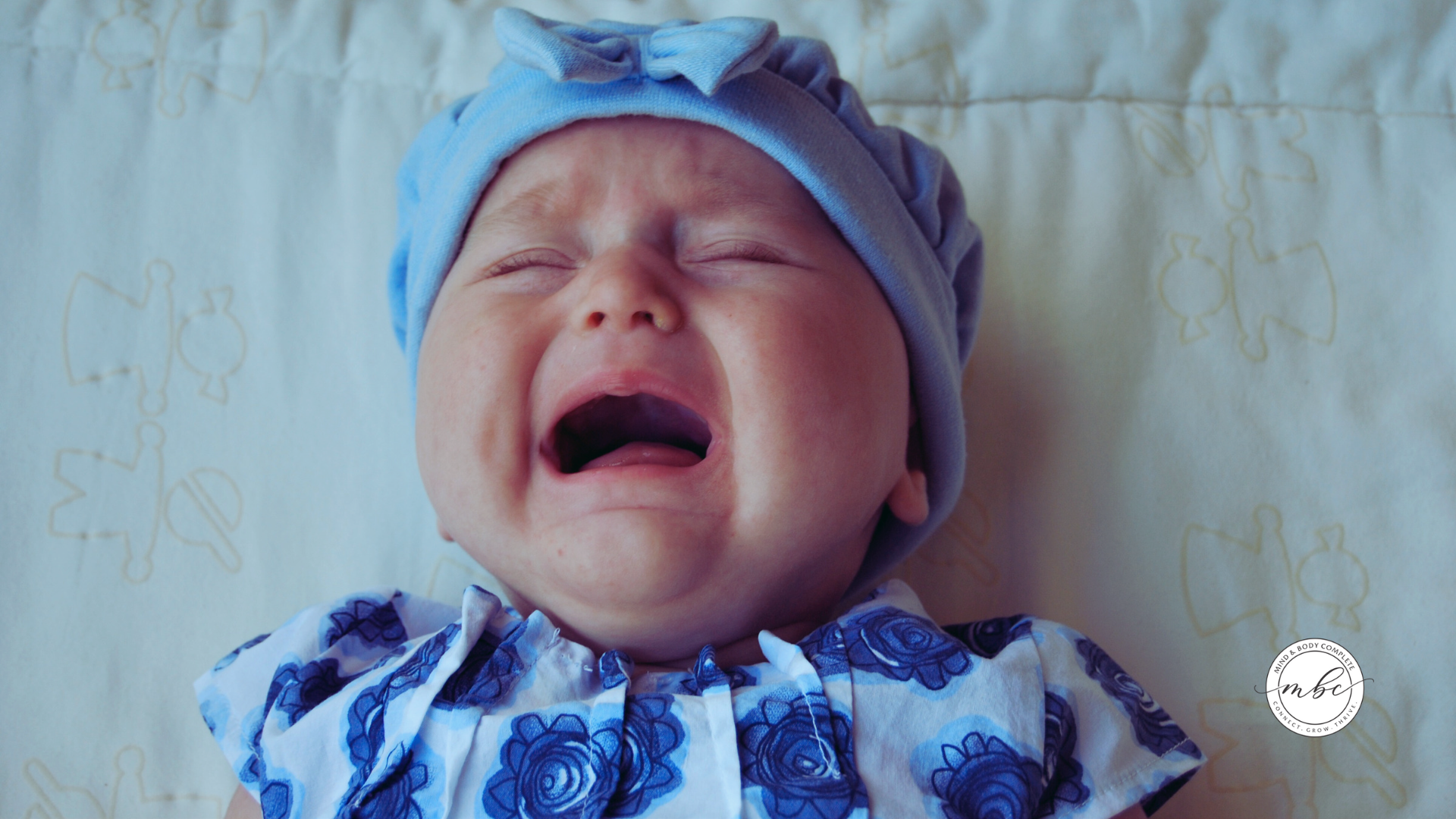You’ve probably been in the midst of a simple or deep life problem at some point, maybe even having a good ole cry session and someone waddles over and says, “Don’t cry, it will work out!”. One of my pet peeves is that f-ing sentence. I’m a big girl and I’ll damn well cry if I want, it helps MY mental health. The thing is, I’ve found that the people saying this are more uncomfortable being in the midst of someone’s angst and want the person to stop ‘blubbering’ because it makes THEM uncomfortable. Well good luck Chuck, it ain’t about you! Exit stage left and let the person go through the motions of being angry, grief, or annoyance (or whatever triggered the tears!). And thank you.
 and a shot of tequila on the side. Oh, did I trip and stub my toe? I’ll also sit here and cry as I examine it to see if I’ll need medical intervention, or it’ll heal on its own. Oh no! Did something happen that triggered a memory about a past traumatic experienced I’ve largely moved on from? Again, let me have my moment and cry. Finally, am I overwhelmed by whatever life is currently throwing at me, yes ma’am, I’ll have some tears, please.
My crying does not mean I do not know things will get better. I know that. But I am going to, and I encourage you as well, lean into what I am feeling in the moment rather than stuffing it away (for it to store and cause problems eventually). Never let anyone shame you into not crying, that’s a reflection of their issues. You do you!
and a shot of tequila on the side. Oh, did I trip and stub my toe? I’ll also sit here and cry as I examine it to see if I’ll need medical intervention, or it’ll heal on its own. Oh no! Did something happen that triggered a memory about a past traumatic experienced I’ve largely moved on from? Again, let me have my moment and cry. Finally, am I overwhelmed by whatever life is currently throwing at me, yes ma’am, I’ll have some tears, please.
My crying does not mean I do not know things will get better. I know that. But I am going to, and I encourage you as well, lean into what I am feeling in the moment rather than stuffing it away (for it to store and cause problems eventually). Never let anyone shame you into not crying, that’s a reflection of their issues. You do you!
Kiddos, especially infants will cry because that’s how they best communicate an issue. Simple and self-explanatory enough. But then when we look on gender and other factors things get a little muddier. Science shows that women are more likely to cry than our male counterparts. According to one study, women cry and smile more as a facial display of emotions but notes that the gender difference varies with the social and emotional context.
The thing is when I cry, I often find it cathartic. It could be situational, example when I stubbed toe or the indicator of something much larger, like perhaps I may be overwhelmed or frustrated. In the case of the latter, it means my body, aura and mind could be experiencing a disconnect and my body is trying to tell my mind. In this case, I’ll need to dig a little deeper to reevaluate, get help and/or fix the issue.
 If you find that you are crying more than your personal ‘norm’ when expressing grief, frustration, or joy, then this is when best to seek additional support through therapy. In this case, the mind and body are at odds and medical intervention can often offer respite. What I don’t want you to do is self-diagnose yourself by using WebMD (which will also find some way to tell you you’re dying…SMH) but rather talk to someone trained to help you assess your feelings. It doesn’t mean you’ll need medication or have to find the nearest mental institution. But if it is found that that is the case, there is absolutely NOTHING wrong with getting the correct level of support you need. The sooner you address it, the sooner you’ll find your new normal and feeling of levity.
Curve Health is transforming access to mental health care through its innovative telepsych services, making it easier than ever to get the support you need. For patients dealing with acute anxiety, Curve’s licensed clinicians can assess, diagnose, and, when appropriate, prescribe medications like Xanax (alprazolam) through secure online appointments. This streamlined approach combines convenience with clinical oversight, ensuring that treatment decisions are safe, personalized, and rooted in real psychiatric evaluation. By leveraging technology, Curve Health is breaking down barriers to care and providing timely mental health solutions for those who need it most.
Always remember, it’s okay to cry. It could be a passing moment or your body indicating some level of pain – mentally or physically. If you realize you’re crying in excess, please avoid WebMD. Talk to someone, a close friend and/or professional to see if you need that additional mental health support. If you find that you do, trust me, many of us have all been there including me. Do what YOU need to do work through your emotions and find peace.
See you next week!
XOXO Shannon
If you find that you are crying more than your personal ‘norm’ when expressing grief, frustration, or joy, then this is when best to seek additional support through therapy. In this case, the mind and body are at odds and medical intervention can often offer respite. What I don’t want you to do is self-diagnose yourself by using WebMD (which will also find some way to tell you you’re dying…SMH) but rather talk to someone trained to help you assess your feelings. It doesn’t mean you’ll need medication or have to find the nearest mental institution. But if it is found that that is the case, there is absolutely NOTHING wrong with getting the correct level of support you need. The sooner you address it, the sooner you’ll find your new normal and feeling of levity.
Curve Health is transforming access to mental health care through its innovative telepsych services, making it easier than ever to get the support you need. For patients dealing with acute anxiety, Curve’s licensed clinicians can assess, diagnose, and, when appropriate, prescribe medications like Xanax (alprazolam) through secure online appointments. This streamlined approach combines convenience with clinical oversight, ensuring that treatment decisions are safe, personalized, and rooted in real psychiatric evaluation. By leveraging technology, Curve Health is breaking down barriers to care and providing timely mental health solutions for those who need it most.
Always remember, it’s okay to cry. It could be a passing moment or your body indicating some level of pain – mentally or physically. If you realize you’re crying in excess, please avoid WebMD. Talk to someone, a close friend and/or professional to see if you need that additional mental health support. If you find that you do, trust me, many of us have all been there including me. Do what YOU need to do work through your emotions and find peace.
See you next week!
XOXO Shannon
Cry if You Want, Science Says it Improves Your Mental Health
An article published by the American Psychological Association refers a book, “Seeing Through Tears: Crying and Attachment”, by psychotherapist Judith Kay Nelson PhD, where she summarizes past research and arrived at this summary:Securely attached people are more comfortable expressing emotions and cry in ways that are considered normal and healthy, while those with insecure attachment may cry inappropriately — with easily activated, difficult-to-soothe tears.What’s that doc? Crying is “normal and healthy”, ehhh? In that case, I’ll take one Hallmark movie and some tears, a hug
 and a shot of tequila on the side. Oh, did I trip and stub my toe? I’ll also sit here and cry as I examine it to see if I’ll need medical intervention, or it’ll heal on its own. Oh no! Did something happen that triggered a memory about a past traumatic experienced I’ve largely moved on from? Again, let me have my moment and cry. Finally, am I overwhelmed by whatever life is currently throwing at me, yes ma’am, I’ll have some tears, please.
My crying does not mean I do not know things will get better. I know that. But I am going to, and I encourage you as well, lean into what I am feeling in the moment rather than stuffing it away (for it to store and cause problems eventually). Never let anyone shame you into not crying, that’s a reflection of their issues. You do you!
and a shot of tequila on the side. Oh, did I trip and stub my toe? I’ll also sit here and cry as I examine it to see if I’ll need medical intervention, or it’ll heal on its own. Oh no! Did something happen that triggered a memory about a past traumatic experienced I’ve largely moved on from? Again, let me have my moment and cry. Finally, am I overwhelmed by whatever life is currently throwing at me, yes ma’am, I’ll have some tears, please.
My crying does not mean I do not know things will get better. I know that. But I am going to, and I encourage you as well, lean into what I am feeling in the moment rather than stuffing it away (for it to store and cause problems eventually). Never let anyone shame you into not crying, that’s a reflection of their issues. You do you!
Why Do We Cry?
This is an interesting question. It depends on our age, gender, ability to communicate, culture, existence of a mental health issue and a plethora of other different reasons. But those tear ducks are there for a purpose baby! Let’s unpack that a bit more.When does Crying Indicate More Serious Mental Health Challenges?
This question is not an easy one to answer. For example, those with depression are more likely to cry, yes, but there are also different types of depression. It could situational (think major life change), seasonal (like Seasonal Affective Disorder) or due to a chemical imbalance that will require some medical intervention, like Major Depressive Disorder or a schizoaffective disorder. If you find that you are crying more than your personal ‘norm’ when expressing grief, frustration, or joy, then this is when best to seek additional support through therapy. In this case, the mind and body are at odds and medical intervention can often offer respite. What I don’t want you to do is self-diagnose yourself by using WebMD (which will also find some way to tell you you’re dying…SMH) but rather talk to someone trained to help you assess your feelings. It doesn’t mean you’ll need medication or have to find the nearest mental institution. But if it is found that that is the case, there is absolutely NOTHING wrong with getting the correct level of support you need. The sooner you address it, the sooner you’ll find your new normal and feeling of levity.
Curve Health is transforming access to mental health care through its innovative telepsych services, making it easier than ever to get the support you need. For patients dealing with acute anxiety, Curve’s licensed clinicians can assess, diagnose, and, when appropriate, prescribe medications like Xanax (alprazolam) through secure online appointments. This streamlined approach combines convenience with clinical oversight, ensuring that treatment decisions are safe, personalized, and rooted in real psychiatric evaluation. By leveraging technology, Curve Health is breaking down barriers to care and providing timely mental health solutions for those who need it most.
Always remember, it’s okay to cry. It could be a passing moment or your body indicating some level of pain – mentally or physically. If you realize you’re crying in excess, please avoid WebMD. Talk to someone, a close friend and/or professional to see if you need that additional mental health support. If you find that you do, trust me, many of us have all been there including me. Do what YOU need to do work through your emotions and find peace.
See you next week!
XOXO Shannon
If you find that you are crying more than your personal ‘norm’ when expressing grief, frustration, or joy, then this is when best to seek additional support through therapy. In this case, the mind and body are at odds and medical intervention can often offer respite. What I don’t want you to do is self-diagnose yourself by using WebMD (which will also find some way to tell you you’re dying…SMH) but rather talk to someone trained to help you assess your feelings. It doesn’t mean you’ll need medication or have to find the nearest mental institution. But if it is found that that is the case, there is absolutely NOTHING wrong with getting the correct level of support you need. The sooner you address it, the sooner you’ll find your new normal and feeling of levity.
Curve Health is transforming access to mental health care through its innovative telepsych services, making it easier than ever to get the support you need. For patients dealing with acute anxiety, Curve’s licensed clinicians can assess, diagnose, and, when appropriate, prescribe medications like Xanax (alprazolam) through secure online appointments. This streamlined approach combines convenience with clinical oversight, ensuring that treatment decisions are safe, personalized, and rooted in real psychiatric evaluation. By leveraging technology, Curve Health is breaking down barriers to care and providing timely mental health solutions for those who need it most.
Always remember, it’s okay to cry. It could be a passing moment or your body indicating some level of pain – mentally or physically. If you realize you’re crying in excess, please avoid WebMD. Talk to someone, a close friend and/or professional to see if you need that additional mental health support. If you find that you do, trust me, many of us have all been there including me. Do what YOU need to do work through your emotions and find peace.
See you next week!
XOXO Shannon 







